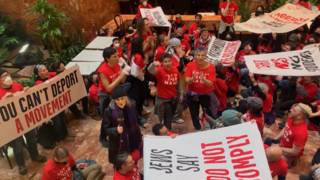
Among the thousands who braved the stormy weather and marched on Washington, D.C., as part of the first-ever global March for Science were students, teachers, nurses, researchers and even science fiction writers. Democracy Now! spoke to some of them about why they marched.
Watch our complete special broadcast from the March for Science.
Transcript
RENÉE FELTZ: This is Renée Feltz for Democracy Now! We’re at the Washington Monument. Just beneath it, the March for Science on Earth Day. We’re going to talk to some of the people who are arriving to take part.
CHLOE FILIPOWICZ: Hi. My name is Chloe Filipowicz. And my sign says “Science is cool.”
RENÉE FELTZ: And you made your sign?
CHLOE FILIPOWICZ: Yes, I did.
RENÉE FELTZ: Why did you choose that message?
CHLOE FILIPOWICZ: To encourage other people to like focus on science to like tell everybody, like, it matters.
RENÉE FELTZ: Do you like science?
CHLOE FILIPOWICZ: I love it.
RENÉE FELTZ: Some people say girls don’t like science.
CHLOE FILIPOWICZ: I don’t care what other people say.
PAM GASPARD: Hi. Pam Gaspard from Hampton, Virginia. I’m here because we need to pay attention to what’s going on in our world. Climate change is real. We can’t deny that. We have to pay attention to what’s going on. And the people in the White House right now are choosing to ignore that and are bringing in billionaires and millionaires who know nothing about science to make decisions for all of us. And that’s just not good with me. That’s just not—it shouldn’t happen. I’m a second grade teacher. I teach my children science every day. Children love science. But I don’t want them growing up in a world where people are choosing to ignore the importance of science.
PETER VICENTE: My name is Peter Vicente. I’m in fifth grade at Chevy Chase Elementary School.
RENÉE FELTZ: And why are you wearing a lab coat today?
PETER VICENTE: Well, a lot of scientists wear lab coats, so I’m a scientist. I’m here because—well, mostly my family’s here, but I really enjoy science at school, and I think it’s really important that we’re here today to support it.
RENÉE FELTZ: You like to study science in school?
PETER VICENTE: Definitely.
RENÉE FELTZ: What’s your favorite topic in science?
PETER VICENTE: I like circuits a lot, finding out how things work. I like them because they’re—it’s really interesting seeing the zaps at everything and seeing how you need a full circuit and everyone has to work together. And that reminds me on why we’re here today.
BETSY HERING: My name is Betsy Hering, and I’m from Minnesota. And I come down here to visit spring every year with my sister.
RENÉE FELTZ: And what hat are you wearing? It’s quite colorful and distinctive.
BETSY HERING: It’s a brain hat. Basically, it has the sulci and the gyruses, the things that look kind of curly and all squished together, to sort of represent the fact that this is science, and this is one of the organs we need to use if we’re going to have good science. It’s our brain. And it’s a wonderful, miraculous thing. I’m a nurse, and I’ve had lots of experiences with the human body. So it’s to represent who I am and what I think is important.
RENÉE FELTZ: Did you make your hat?
BETSY HERING: Yeah, I did. Basically learned how to knit little noodles, and went and got lots of different colors to represent the different parts of the brain, and then stuck them with double-sided carpet tape. So, it’s all together, and it’s wonderful to be here.
BRENDA CLOUGH: I’m Brenda Clough, and I’m a science-fiction writer. And my sign says “George Orwell, Octavia Butler, Margaret Atwood: They Warned Us!” And these, of course, are dystopian science-fiction writers. You all have heard of 1984 by George Orwell and Margaret Atwood’s The Handmaid’s Tale. They’re actually doing it on cable TV. So, they’re famous dystopian novels, and they’re best-sellers now, because we’re scared.
The flip side of my sign says “Look Down. Do you have Velcro, eyeglasses, a computer, a phone, nylon? And if you do, you should thank a scientist.” There’s the number of—I’ve had people actually on Facebook say to me, “You can’t believe what scientists say.” And I say, “Honey, are you typing this on a keyboard? You’re on the internet? Hello!” It’s like enough to drive you nuts. So, that’s why I made this sign, because I just can’t believe it sometimes.
I am a science-fiction writer, and I’ve been a finalist for both the Hugo and the Nebula awards in the industry, if you know that. And I’ve been a supporter of science for years, because that’s what I—I live and move in it. I write in it. We spend all of our time thinking the thoughts that eventually the real scientists bring to life. Before they went to the moon, someone wrote about it. We wrote about it. You know, before nanotechnology happened, before someone did it, we wrote about it. And that’s why we need it. We need it for us, for our life, for our art.
RENÉE FELTZ: And those are some of the voices here at the March for Science on the National Mall. I’m Renée Feltz for Democracy Now!












Media Options